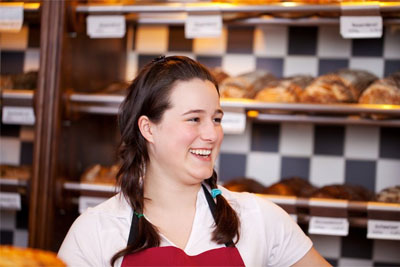Oliver Ashton of Jump!
‘Give me a break!’ Oliver Ashton and the team at Jump Programmes give this phrase a new lease of life, facilitating young people, often aged between 16 and 18, into work through organised apprenticeships with partners who want to develop their next generation of workers in a way that benefits everyone.
With a career path that includes having set up an exchange to ease tension between the police and disadvantaged youths, Oliver’s got an understanding of the whole spectrum of obstacles that are splayed out in front of today’s teenagers. It’s refreshing to talk to someone who says it how he sees it, and even more inspiring because this director of Jump was once one of those kids for whom the future seemed pretty terrifying...
What's Jump about?
"We are about creating a confident mindset and providing a positive environment through apprenticeships. So we work with young people, taking them fresh out of school or college or youth organisations, and ask 'What do you want to do and how can we make that happen?' Then we teach them about the world of work by giving them pre-employment training, matching them with employers that we partner with," says Oliver, explaining that there is a team of 25 at Jump with about 10 out on the field talking to companies about the opportunities young people bring to the table. "Once they're in, we support them in work with a 12 month NVQ; we deliver it and help them complete it so they have a qualification and can take the first step on their career ladder."
Ideal qualities in apprentices and employers
"What we're looking for a in a young person is their willingness to get involved, an attitude that desires work." Nevertheless, Jump doesn't turn anyone away but instead strives to improve behaviours and explain about things like time keeping and language; "There are a lot of rough diamonds out there. To get off the programme they'd have to do something completely unacceptable such as violence."
Oliver is actually a bit tougher on employers, "We're looking for people that want to develop their next generation of young talent, there is a reduced wage for the programme but if we feel that they employer is after some cheap labour and are not interested in investing in that young person's development, which is really what the pay off is, then we're not interested."
On education today
"There's been a move from classroom-based learning, which came from the Victorian workhouse model, to more vocational learning. Sitting down and studying can really suit some people - it's not that it doesn't - but to think that it's going to suit everyone is crazy. People who don't fit in are classed as having ADHD, learning difficulties or just as being thick - actually they're just not allowed to play to their strengths and they're being restricted in who they are and what they're about." Oliver feels they are being set up to feel like failures and in turn lose confidence, and he has a hypothesises to illustrate this; "If you were to take that whole classroom and put them all in a more practical environment, you'd have the other half of them fail at that and the others would start to excel and become top dogs."
"Individual Learning Plans have to be the movement," says Oliver, pondering on the work there is yet to be done. "Why are we judging kids so early? What other factors are affecting their performance? Some kids live on the breadline, nutrition is also going to effect their learning ability and brain development. It's a big nut to crack."
ContainerVille and growth
"We're in Containerville right now and it's been a really good, safe haven for us; an incubator to build ourselves to the point where we're about to outgrow this place. We started up Jump and got our first contract 2 years ago and decided to move into apprenticeships - very much focused on IT and creative/digital media - and now we've got partners like Salesforce. It has a philanthropic arm called BizAcademy that is sponsoring 120 young people through a 4 week training programme and then a 12 month apprenticeship in an IT role learning the Salesforce software, and then straight into some amazing jobs with people like Aviva and Cloud Symphony."
Oliver explains that a lot of people - CEOs, senior and middle management - have come up through some form of apprenticeship programme like YTS back in the day, so they see it as their duty; "Often they can see what this young person can add to their business: vibrancy, new ideas, someone to mould in their way, in 2-3 years time that's their team leader or manager. 75% of young people in apprenticeships are more likely to stay with that employer than those not on an apprenticeship. It also locks the young person in, they are not likely to leave because their qualification is tied to it. But there's no way we would want to set up a relationship to fail, because if it falls apart we lose out - we only get paid to deliver the qualification, not to recruit the apprentice or the employer or to match them together."
How it all works
With the government only funding the qualification, Oliver explains that a lot extra goes in at Jump; "You might work with a group of young people and only half of them go into work, and then 20% of those drop off later down the line. That's a lot of work that you don't get paid for." He breaks down the finances; "80% is paid in 13 instalments over 12 months (2 at the beginning) and the other 20% is paid in the 12 month. If anyone drops out, the funding stops at that point, so it's a pretty ruthless model quite frankly. We are probably audited and are under more stringent checks than financial organisations are - there is an EV (external verifier) in there now! I'm sure there's easier ways to make money, honestly!" His complete transparency about how it all works, and slight exasperation at the red tape, is testament of his commitment to the industry.
The drive behind Jump Programmes
"I went through the care system and I came from that kind of lifestyle when I was younger so that's driven me personally. My background used to feel like a hindrance but once I got my head round what was possible I started to focus on being proud of it - I spent so long banging my head against the brick wall of authority I thought 'Why don't I help young people who also feel like they're fighting a losing battle?' I lost badly, I ended up in various institutions, pre-18 luckily for me, but so many people have given me a chance when they didn't have to" - or a jump start, says Oliver, explaining the name of the organisation.
Oliver the entrepreneur
Oliver's self-made career started off on a slightly different path; "I had a market stall in Spitalfields and a couple in Camden, I used to sell fairy lights and little gadgets. This is a great link - we became the market leader and were bringing 10 of these 40 foot containers" - he points to the container that Jump's office is in - "just full of fairy lights each year. Can you just imagine the amount? The first time I went to the docks I was like 'Oh my God.'"
"My company was helped by the Princes Trust right at the beginning with some seed investment and a mentor, and I really appreciated that. That's where it started from, I became a mentor as well, that was maybe 12 years ago. I really enjoyed it, and on the flip side I started to feel like my company was just littering on a massive scale: they're pulling oil out of the ground in Iraq, selling it to China, China turns it into plastic, I turn it into fairy lights, we ship it here and someone puts it up for 6 months. It looks great, then they chuck it in the bin and it goes into landfill - there were just too many downsides in the delivery chain for me so I started moving away from that and towards working with young people," recalls Oliver, now 43 and self-employed for the last 16-17 years.
The move into youth related work
"I had to start at the bottom again and my first real job was working with excluded kids in Tottenham which had the highest child gun mortality rate I think in all of Europe at that time - they stuck me in with a whiteboard and I cut my teeth like that. Then I started a project with gang-affected youths in 2005, mainly in Walthamstow and Waltham Forest but in Bromley and Westminster as well, when I ended up meeting an inspector from The Met. He came from that side of things and I've got a background that's closer to the young people I was working with, and we had a sort of meeting of minds so I wrote and facilitated community cohesion programme in no-go areas where there was a lot of tension between the police and the young people - we just put everyone in a room along with members of the local community and had it out for a couple days."
The main inspector involved fell ill and the police pulled funding just before the programme was about to rolled out pan-London, but over the years Oliver set up the Pineapple Club (a mentor group of elders from Caribbean and African communities), offender projects and through the gate initiatives; "For kids who give it all the bravado but underneath it all were actually really, really scared and very, very nervous about the process of getting into work. Being able to do that is golden to me, so I established Jump along with a contract manager from an offender project and a director from an motivational training organisation I worked at."
What happened when the police and local youth were in a room together?
"It was amazing because some great things came out of it like the young people building their confidence and learning how to negotiate. There was an injunction put into place on an estate where no one was allowed to hang out with more than two people at a time after curfew, they argued it was more dangerous for them because they were always at war with other gangs of youths and being in such small numbers meant they were sitting ducks; 'We are practically on our own, five of them will pull up in a car, jump out and batter us, and that's what is happening. You're thinking you're protecting us but actually you've made us more vulnerable to attack.' The police were really able to listen to them and some of these mini laws were quashed." The relationship built up to the point where the police and young people featured in a fashion show together, with TK Maxx providing them with clothes.
Were psychologies reflected between The Met and the kids? "The young people were prepped and we put a few parameters around them prior to the programme but they're not from a professional background, I actually felt the group dynamic was disturbed more by the police. I remember one time I had to pull a police officer aside - he was really aggressive, winding up the young people and just generally unproductive - him and another officer were actually disciplined. But the majority of the police on the programme were absolutely phenomenal, it restored my faith in the force. It's like anywhere, it's a cross-section of society."








